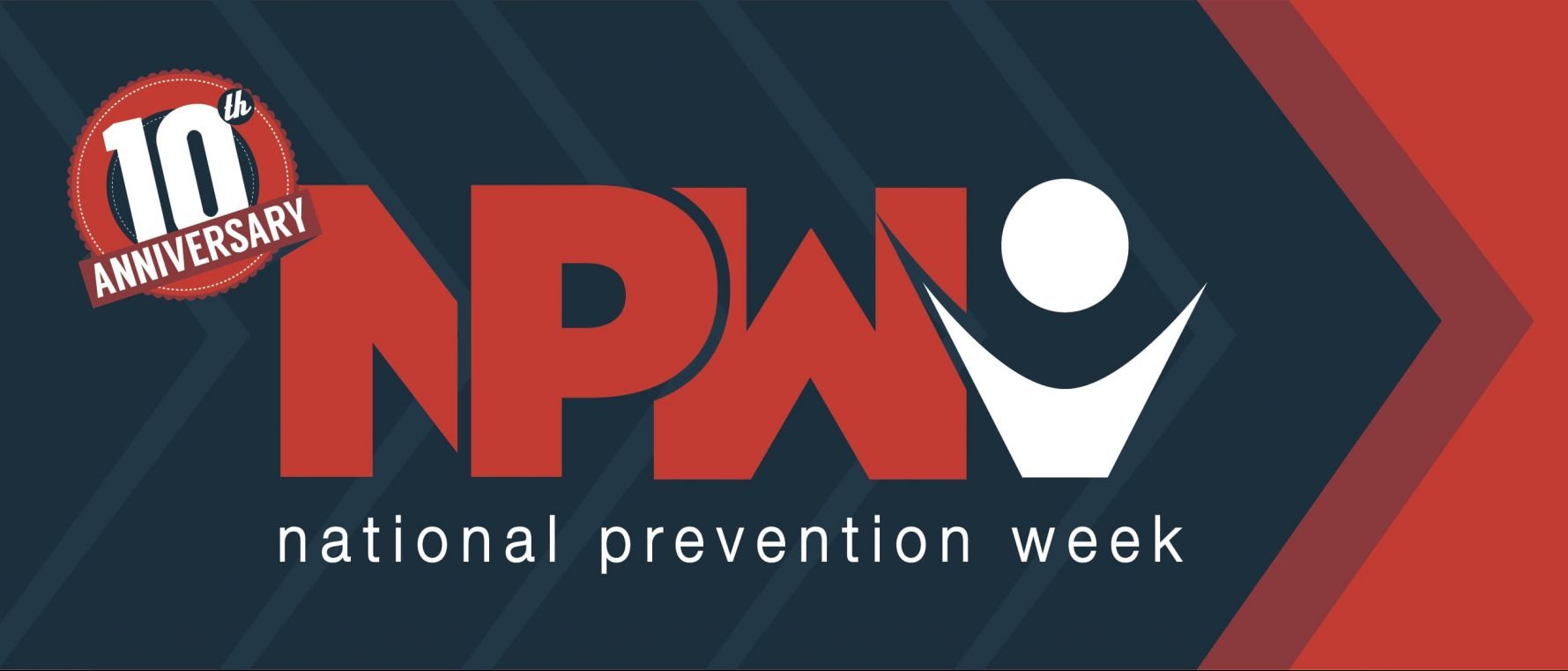
Honoring National Prevention Week 2021
By Tamika Gilchrist, Senior Substance Use Prevention Specialist
What is National Prevention Week (NPW)?
NPW is an annual health observance dedicated to increasing public awareness and action around substance use prevention and the promotion of positive mental health. This year, this national initiative, sponsored by the Substance Abuse and Mental Health Services Administration (SAMHSA), will take place May 9th-15th.
Why is prevention so important?
Prevention is important because it delays the onset of the first use of alcohol, tobacco, or other drugs. This ultimately protects the growing brain and body during adolescence. Prevention also contributes to positive health behaviors and healthy lifestyles. Each year, NPW incorporates daily health themes to focus on pressing substance use topics. These themes are highlighted this week to increase awareness but the conversations need to be ongoing to support the health and wellness of our families and our communities. The 2021 daily health themes are:
Monday: Preventing Prescription Drug and Opioid Misuse
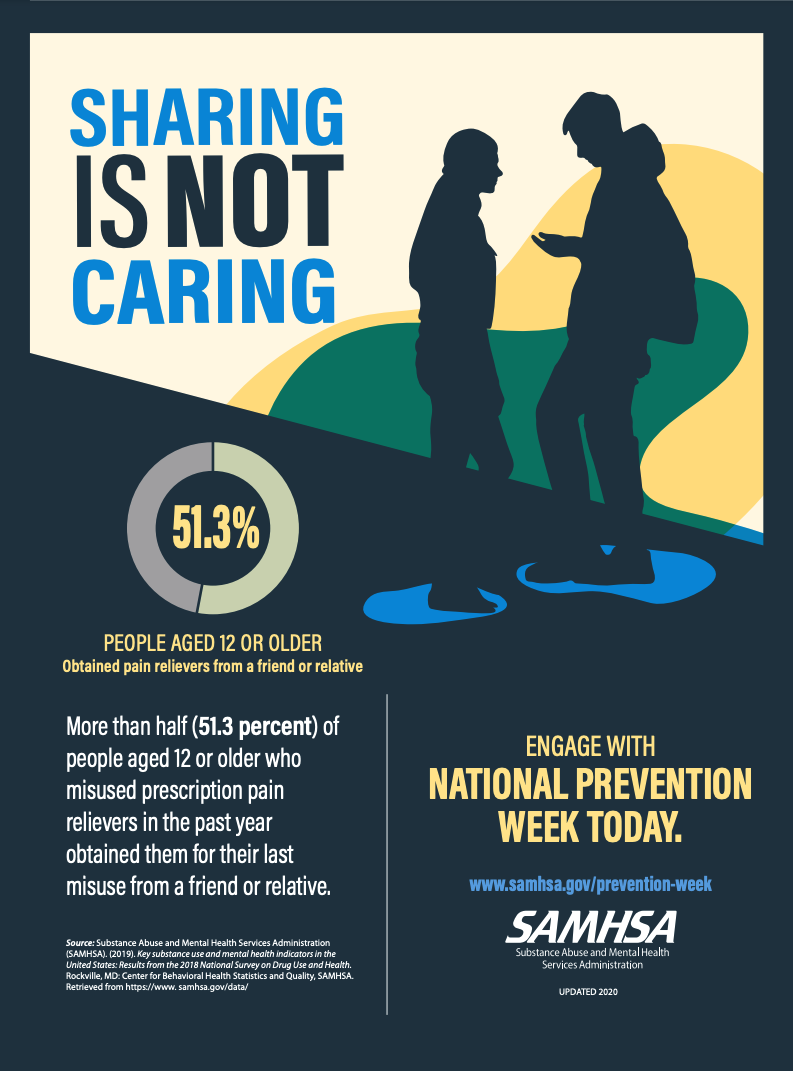 Securing and monitoring medications supports proper medication use by intended users and prevent unintentional access and misuse. Here are a few tips to help secure and monitor medications in the home:
Securing and monitoring medications supports proper medication use by intended users and prevent unintentional access and misuse. Here are a few tips to help secure and monitor medications in the home:
- Use a medication lock box or pouch.
- Use a locked cabinet.
- Use a locked closet.
- Keep out of reach of others.
- Count and make sure you follow all instructions for the medication.
Disposing of unused and expired medications from the home also prevents unintentional access and misuse. Proper disposal prevents unintended access and is safer for the environment by preventing medication from entering water sources. Here are a few tips to help dispose of medications properly:
- Find a secure, locked drop box in your community or take the medication to your local pharmacy and ask them to dispose of it properly.
- Use a medication disposable bag (deactivation kit).
- Avoid flushing medication down the toilet or in the sink.
- Avoid disposing of medication in the trash can unless using a deactivation kit.
- Never give your medication to anyone else. The medication is prescribed and/or recommended for you according to your medical needs.
For Information on Drop-Off Locations:
Wake County: Find a dropbox. | Across North Carolina: Maps of locations | For more information: Visit www.lockyourmeds.org/NC
Tuesday: Preventing Underage Drinking and Alcohol Misuse
Alcohol is the most-used substance and the leading cause of death among youth in the United States. More teens die as a result of alcohol use than all other illicit drugs combined. In North Carolina, 12% of teens had their first drink of alcohol before the age of 13. If you are wondering how you as a parent, caregiver, and other adults can do to prevent underage drinking and alcohol misuse, keep reading!
Ongoing conversations around the dangers of alcohol and other drugs are needed. Using the opportunities of everyday life as reasons to naturally bring up the conversation is vital. Demonstrate that you are a great source to receive information, show that you care about their wellbeing and growth, and help build their skills to avoid alcohol and other drug use. Utilizing role-play scenarios to practice creative ways to refuse or say “no” to being offered alcohol can help build the confidence and skills to abstain from alcohol consumption.
Check out this video for ideas on how to start the conversation. For more information on how to talk to the children and youth in your life, visit Talk. They Hear You and download the app for interactive scenarios and tips.
Talk it Up! Lock it Up!TM is an innovative strategy to change the physical environment relative to youth access to alcohol in homes. If you have alcohol in your home, ensure it is secured to prevent easy access by youth. Here are a few tips:
- Monitor the alcohol that is in your home by taking inventory and being aware of the amount and types of alcohol available.
- Ensure alcohol in the home is not easily accessible. Secure alcohol by placing it in a locked cabinet or closet. If you have a fridge for wine or beer, consider adding a fridge lock. Cabinet locks and fridge locks can be purchased at your local hardware store or online.
Take the pledge to Talk It Up. Lock It Up!™ and encourage others to take the pledge and start the conversation today!
Wednesday: Preventing Illicit Drug Use and Youth Marijuana Use
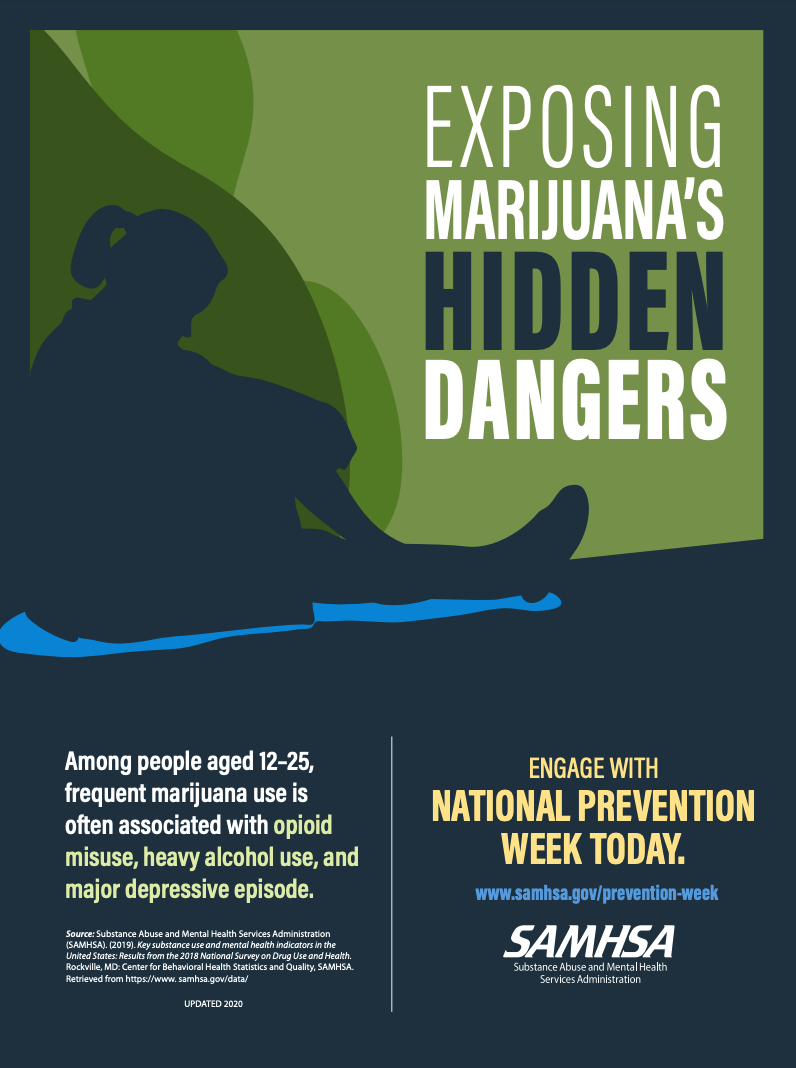 According to the National Youth Risk Behavior Survey (YRBS), in 2019, 36.8% of youth reported ever use of marijuana. 21.7% of youth reported current marijuana use (one or more times during the 30 days before the survey). Marijuana use has short-and-long-term effects on the brain. In addition to a wide range of effects physically and mentally.
According to the National Youth Risk Behavior Survey (YRBS), in 2019, 36.8% of youth reported ever use of marijuana. 21.7% of youth reported current marijuana use (one or more times during the 30 days before the survey). Marijuana use has short-and-long-term effects on the brain. In addition to a wide range of effects physically and mentally.
The YRBS report also showed that 3.9% of youth have ever used cocaine and 7.0% of youth have ever used a hallucinogenic drug such as LSD at least one or more times during their life. Many illicit drugs pose major health risks and can cause addiction after a single use. Illicit drug use can impose short-and-long-term consequences including damage to relationships and friendships, lack of motivation to maintain grades in school, legal consequences, and death. It is important to be up to date on drug trends and facts. NIDA for Teens, SAMHSA’s Tips for Teens, and the Poe Center for Health Education are all great resources to utilize.
Thursday: Preventing Youth Tobacco Use (E-cigarettes and Vaping)
The Center for Disease Control (CDC) reports that due to e-cigarette/vaping use, thousands of people in the U.S. have been hospitalized with serious lung injuries. As of February 2020, 68 deaths have been confirmed in 29 states and the District of Columbia. There are more deaths under investigation.
Quitline: By phone: 1-800-QUIT–NOW (1-800-784-8669) | Online: QuitlineNC.com, | Quitline Resources during COVID-19
Text to quit vaping: Text DITCHJULL to 88709
Friday: Preventing Suicide
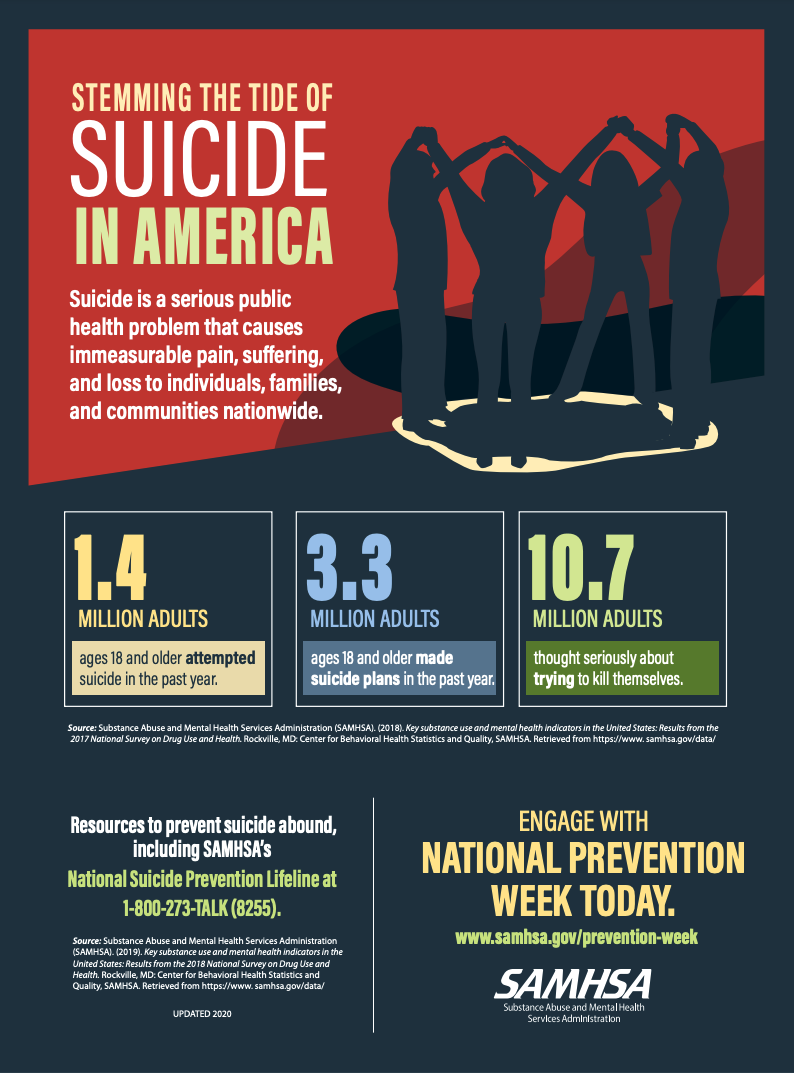 According to the Centers for Disease Control and Prevention, suicide is the 10th leading cause of death in the United States. It was responsible for more than 47,500 deaths in 2019, which is about one death every 11 minutes. Warning signs for suicide include:
According to the Centers for Disease Control and Prevention, suicide is the 10th leading cause of death in the United States. It was responsible for more than 47,500 deaths in 2019, which is about one death every 11 minutes. Warning signs for suicide include:
- Talking about feeling trapped or in unbearable pain.
- Talking about being a burden to others.
- Increasing the use of alcohol or drugs.
- Acting anxious or agitated; behaving recklessly.
- Sleeping too little or too much.
- Withdrawing or feeling isolated.
- Showing rage or talking about seeking revenge.
- Displaying extreme mood swings.
Protective factors are personal or environmental characteristics that help protect people from suicide. According to the Suicide Prevention Resource Center, major protective factors for suicide include:
- Effective behavioral health care.
- Connectedness to individuals, family, community, and social institutions.
- Life skills (including problem-solving skills and coping skills, ability to adapt to change).
- Self-esteem and a sense of purpose or meaning in life.
- Cultural, religious, or personal beliefs that discourage suicide.
If you or someone you know is in crisis, please contact the National Suicide Prevention Lifeline. Both resources are free and confidential: 1-800-273-TALK | Online Lifeline Crisis Chat
Resources for Prevention Week:
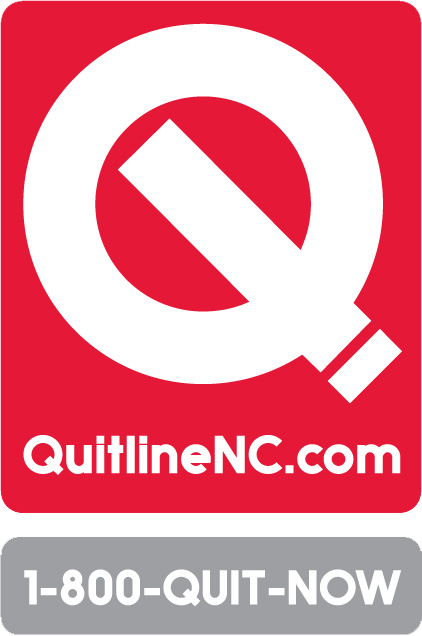 SAMSHA’s National Prevention Week 2021 – Learn more about National Prevention Week
SAMSHA’s National Prevention Week 2021 – Learn more about National Prevention Week
CDC.gov/suicide/facts – Learn more about how suicide affects us.
SAMHSA. Talk They Hear You. – More about underage drinking and preventing it.
QuitlineNC.com – Quit smoking or vaping today.
LockYourMedsNC – Lock up your medications or find a drop-off location.
Trends in Prevalence of Marijuana, Cocaine, and other Illegal drug use National YRBS
Featured Poe Program: For the Health of It!

Participants: 6th – 8th
Program Length: 60 minutes
Participants will discover how using drugs and alcohol can damage their brains and bodies. This program is centered around interactive activities that focus on “showing and not telling” kids how their brains are affected by alcohol and drug (inhalants, marijuana) use. Real-life scenarios are used to help participants analyze how a “drugged” brain affects their actions and decision-making skills. Participants will also engage in role-play, reinforcing refusal skills.
Programs can be presented online and are great for youth and family groups to participate from home. Call (919) 231-4006 for details.
